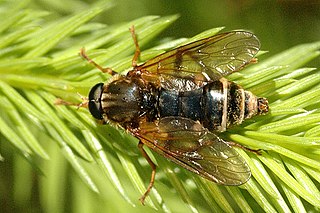
The Brachyceran infraorder Xylophagomorpha is a small group that consists solely of the family Xylophagidae, which presently contains subfamilies that were sometimes considered to be two small related families. Other obsolete names for members of this family include Exeretonevridae and Heterostomidae.

Rhagionidae or snipe flies are a small family of flies. They get their name from the similarity of their often prominent proboscis that looks like the beak of a snipe.

Eugene Séguy was a French entomologist and artist who specialised in Diptera. He held a chair of entomology at the Muséum national d'histoire naturelle in Paris from 1956 to 1960. He is also known for establishing the Diptera section at that museum. This entomologist is often confused with a French artist with a similar name: Émile-Allain Séguy (1877–1951). The latter is known for his pochoir artworks representing plants and insects.

Rhagio is a worldwide genus of predatory snipe flies. Several species in this genus are referred to as downlooker or down-looker flies because they sometimes perch on tree trunks in a head-down position. There are approximately 170 species. They can be distinguished from other rhagionids by the open anal cell on the wings and the lack of a kidney-shaped arista.

Xylota is a Holarctic genus of hoverflies similar in structure to the related genera Chalcosyrphus and Brachypalpoides. As the larvae are saprophytic they're usually found in rotting wood. The adult flies are generally associated with woodland and woodland edges and can often be seen running over the upper sides of leaves. Unlike other syrphids the adults of many species rarely visit flowers preferring instead to gather pollen from leaf surfaces. There are over 100 described species of which 12 can be found in Europe. Seven species have been recorded in Britain. Identification of species has been difficult and identifiction by photographs is risky.
Arthroceras is a genus of snipe fly of the family Rhagionidae. Arthroceras are mid-sized to large 4.5 to 13 millimetres, black, grey, or yellowish-colored flies that have a fairly long, tapering antenna consisting of 5–8 flagellomeres. Within Rhagonidae, the genus is sometimes(?) placed in the subfamily Arthrocerinae, in which it is the only genus.

Oxycera is a genus of soldier flies in the family Stratiomyidae. There are at least 80 described species in Oxycera.

Actina is a genus of flies in the family Stratiomyidae.

Rachicerus is a genus of flies in the family Xylophagidae.

Atherix is a genus of 'ibis flies' belonging to the family Athericidae, a small family very similar to the Rhagionidae. Species within this genus are present in most of Europe and also in the Nearctic realm.

Solva is a fly genus in the family Xylomyidae, the "wood soldier flies".

Xylophagus ater is a species of awl fly belonging to the family Xylophagidae found in Central Europe and North Europe.

Xylomya is a fly genus in the family Xylomyidae, the "wood soldier flies". There are at least 30 described species in Xylomya.

Acrocera is a genus of small-headed flies in the family Acroceridae.

Dialysis is a genus of flies in the family Xylophagidae.

Xylophagus is a genus of flies in the family Xylophagidae.

Coenomyia is a genus of flies in the family Xylophagidae.
Glutops is a genus of flies in the family Pelecorhynchidae.
Suragina is a genus of flies in the family Athericidae.















